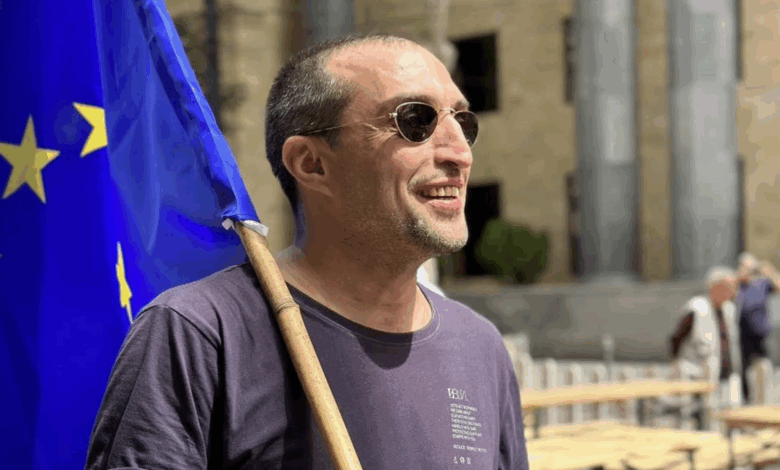
Doctor and Activist Acquitted of Drug Charges in First Not-Guilty Verdict Tied to Current Protests
Giorgi Akhobadze, a 44-year-old doctor and civic activist, was acquitted of heavy drug charges, marking the first not-guilty verdict in dozens of ongoing criminal trials of those detained in the context of protests since November 2024. He was released from the courtroom after eight months in pre-trial custody.
Cheers erupted in the corridors of Tbilisi City Court on August 6, as Judge Romeo Tkeshelashvili finally delivered a long-delayed ruling, more than ten days after the initial verdict announcement was expected. Earlier that day, Batumi City Court sentenced journalist Mzia Amaghlobeli to two years in prison, reclassifying the original criminal charges of assaulting a police officer. Together, the two rulings may signal a significant retreat from the Georgian judiciary’s previously uncompromising approach to protest-related cases.
“Fight till the end!” – Akhobadze said in his first media remarks in the courtyard after his release, thanking journalists and supporters. He said he had some anticipation of the positive ruling with “foolish optimism.” He vowed not to stop, saying that “it is impossible for this country to become Russia and remain in Russian hands.”
Akhobadze, a prominent figure with a strong social media following due to his civic activism, was arrested on December 7, 2024, while driving home from a pro-EU rally on Rustaveli Avenue. Prosecution, led by Shmagi Gobejishvili, alleged that Akhobadze had illegally obtained more than three grams of the synthetic drug Alpha-PVP.
He was charged under Article 260 of the Criminal Code with the illegal purchase and possession of a large quantity of narcotics, an offense punishable by 8 to 20 years in prison or life imprisonment. Akhobadze had denied the charges, claiming the drugs were planted and that he was targeted for his political activism.
According to the prosecution, police stopped and searched Akhobadze based on operational information detailed in a report compiled four to five hours before the arrest. The report claimed that Akhobadze might have been in possession of narcotics.
But Akhobadze’s defense highlighted multiple flaws and inconsistencies in the prosecution’s case. His lawyer, Lasha Tsutskiridze, told Radio Liberty that the arrest was unlawful, citing the police’s failure to provide video documentation of the search or to involve a neutral witness, both procedures required when seizing illegal substances based on operational intelligence.
According to Tsutskiridze, Akhobadze reported the presence of at least six police officers at the scene, contradicting the police report, which claimed officers lacked the technical and human resources to document the search.
The defense further alleged evidence fabrication, citing Akhobadze’s account that officers forcibly collected his saliva with their fingers upon detention. His other lawyer, Mariam Madzgarashvili, cited expert testimony confirming that a sample of Akhobadze’s saliva was found on the drug packaging. According to the defense, this raised serious concerns that the evidence may have been deliberately tampered with, suggesting the possibility that officers artificially contaminated the package to link it to Akhobadze.
Akhobadze’s case was initially overseen by Judge Mikheil Jinjolia, but in a sudden move seven months after the arrest, he was replaced by Judge Romeo Tkeshelashvili on July 4.
At the time of his detention, Akhobadze was the primary caretaker of his bedridden mother, who passed away in January, just a month after his arrest. Her death marked one of at least four instances in which individuals detained in protest- or opposition-related cases lost a parent while in custody.
A wider pattern
Five other protesters and activists are awaiting verdicts on similar drug-related charges, including journalist Nika Katsia, Tedo Abramov, Anastasia Zinovkina, Artem Gribul, and Anton Chechin. Zinovkina, Gribul, and Chechin are Russian citizens. They all allege politically motivated drug planting.
The arrests on heavy drug charges have drawn significant scrutiny and criticism.
Georgian civil society organizations monitoring the cases alleged in February that the Georgian Dream government sought to discredit the protest movement by targeting high-profile demonstrators with serious drug-related arrests. According to these groups, the arrests followed a consistent pattern: investigations initiated on unverified “operative information” from undisclosed sources; testimonies relying solely on law enforcement officers and affiliated witnesses; and a lack of neutral observers or video recordings during searches.
Akhobadze is the first person to be acquitted in a series of ongoing criminal cases among those detained in the context of protests that broke out following the disputed October 26 parliamentary elections. Nine people were given jail sentences before, including journalist Mzia Amaghlobeli, Anri Kakabadze, Anri Kvaratskhelia, Saba Jikia, Giorgi Mindadze, Mate Devidze, Denis Kulanin, Daniel Mumladze, and Guram Khutashvili.
Seven more remain in prison after being convicted over their involvement in the spring 2024 protests against the foreign agents law, including Omar Okribelashvili, Saba Meparishvili, and Pridon Bubuteishvili, who were convicted in January, Davit Koldari, Giorgi Kuchuashvili, and Giorgi Okmelashvili, who were convicted in February, as well as Irakli Megvinetukhutsesi, convicted in December.
Eight individuals, including six active opposition politicians, were recently sentenced to prison terms of several months for defying the Georgian Dream investigative commission.
Politpatimrebi.ge, a civic platform documenting the cases of detainees, currently lists over 60 persons who were jailed in 2024-2025 and are considered political prisoners.
Also Read:
- 09/07/2025 – Interior Ministry Rejects Political Targeting in Drug Roundups
- 09/07/2025 – Police Round Up Activists for Drug Tests Amid Crackdown
- 03/07/2025 – GD Bans Drug Replacement Therapy, Psychotropic Imports for Private Sector
- 02/07/2025 – Georgian Dream Criminalizes Small Marijuana Possession
This post is also available in: ქართული